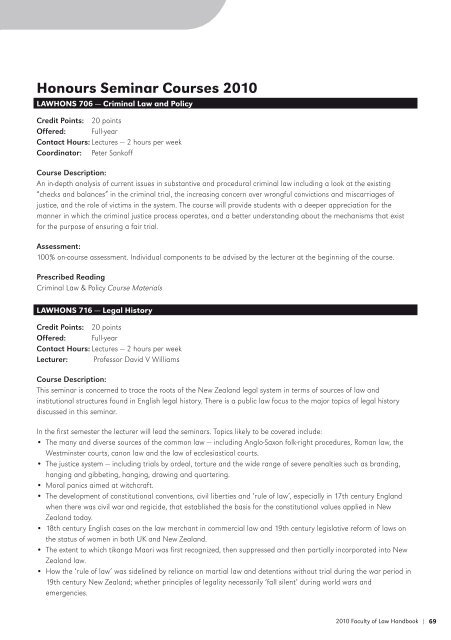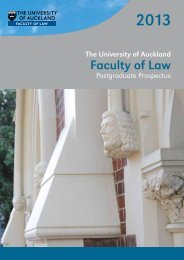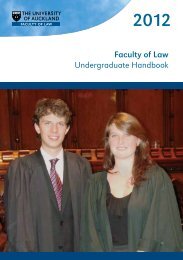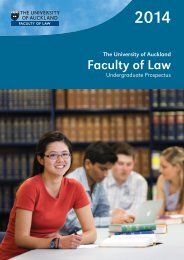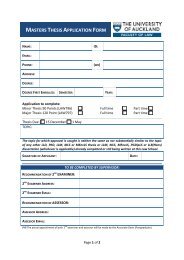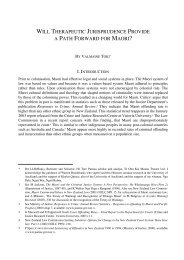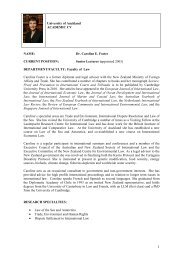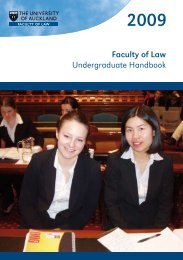Faculty of Law Undergraduate Handbook - Faculty of Law - The ...
Faculty of Law Undergraduate Handbook - Faculty of Law - The ...
Faculty of Law Undergraduate Handbook - Faculty of Law - The ...
- No tags were found...
You also want an ePaper? Increase the reach of your titles
YUMPU automatically turns print PDFs into web optimized ePapers that Google loves.
Honours Seminar Courses 2010LAWHONS 706 — Criminal <strong>Law</strong> and PolicyCredit Points: 20 pointsOffered: Full-yearContact Hours: Lectures — 2 hours per weekCoordinator: Peter Sank<strong>of</strong>fCourse Description:An in-depth analysis <strong>of</strong> current issues in substantive and procedural criminal law including a look at the existing“checks and balances” in the criminal trial, the increasing concern over wrongful convictions and miscarriages <strong>of</strong>justice, and the role <strong>of</strong> victims in the system. <strong>The</strong> course will provide students with a deeper appreciation for themanner in which the criminal justice process operates, and a better understanding about the mechanisms that existfor the purpose <strong>of</strong> ensuring a fair trial.Assessment:100% on-course assessment. Individual components to be advised by the lecturer at the beginning <strong>of</strong> the course.Prescribed ReadingCriminal <strong>Law</strong> & Policy Course MaterialsLAWHONS 716 — Legal HistoryCredit Points: 20 pointsOffered: Full-yearContact Hours: Lectures — 2 hours per weekLecturer: Pr<strong>of</strong>essor David V WilliamsCourse Description:This seminar is concerned to trace the roots <strong>of</strong> the New Zealand legal system in terms <strong>of</strong> sources <strong>of</strong> law andinstitutional structures found in English legal history. <strong>The</strong>re is a public law focus to the major topics <strong>of</strong> legal historydiscussed in this seminar.In the first semester the lecturer will lead the seminars. Topics likely to be covered include:• <strong>The</strong> many and diverse sources <strong>of</strong> the common law — including Anglo-Saxon folk-right procedures, Roman law, theWestminster courts, canon law and the law <strong>of</strong> ecclesiastical courts.• <strong>The</strong> justice system — including trials by ordeal, torture and the wide range <strong>of</strong> severe penalties such as branding,hanging and gibbeting, hanging, drawing and quartering.• Moral panics aimed at witchcraft.• <strong>The</strong> development <strong>of</strong> constitutional conventions, civil liberties and ‘rule <strong>of</strong> law’, especially in 17th century Englandwhen there was civil war and regicide, that established the basis for the constitutional values applied in NewZealand today.• 18th century English cases on the law merchant in commercial law and 19th century legislative reform <strong>of</strong> laws onthe status <strong>of</strong> women in both UK and New Zealand.• <strong>The</strong> extent to which tikanga Maori was first recognized, then suppressed and then partially incorporated into NewZealand law.• How the ‘rule <strong>of</strong> law’ was sidelined by reliance on martial law and detentions without trial during the war period in19th century New Zealand; whether principles <strong>of</strong> legality necessarily ‘fall silent’ during world wars andemergencies.2010 <strong>Faculty</strong> <strong>of</strong> <strong>Law</strong> <strong>Handbook</strong> | 69


